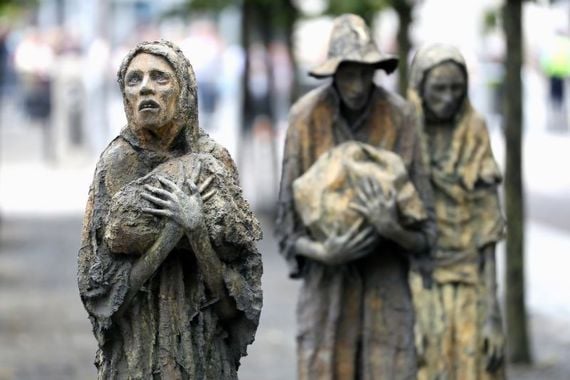Four letters addressed to an Irish-born priest living in Pennsylvania during the time of the Great Hunger express the pain felt by those who remained in Ireland and their desperate attempts to flee their home country, wrecked by poverty and hunger.
Father Thomas Heyden was a Catholic priest living in Bedford, PA who moved to the US from Co. Carlow as a toddler. He remained in contact with people in Ireland who wrote several letters to him over the course of the worst of the Irish famine, detailing what was happening in the country.
While the connection between Fr. Heyden and these people is unknown and there are no remaining copies of his correspondence in return, four letters the Irish priest received during the late 1840s, in which the writer depicts the horrific events, were archived by the Pittsburgh Catholic Diocese, allowing for incredible insights into Irish famine-time life.
The correspondence is clearly not from those suffering from the worst of the famine. They contain plans laid out to travel to the US with money to buy land – a luxury that the vast majority of the 1.5 million famine Irish who traveled to North America could not have afforded. The letters give some account of the loss felt in leaving Ireland, nonetheless.
“When I wrote you last I gave you an account of the probable loss that would attend the failure of the potato crop,” states a February 17, 1847, letter from Thomas Maher to Fr. Heyden.
“I was very far from knowing the real loss, but now, alas, I know it at my own expense.
“You must have seen through the press the number of deaths from starvation and its concomitant diseases [of] fever and dysentery. And do not imagine there is any exaggeration in the reports.”
“Your timely interferences will save us from the destitution many of our poor countrymen and women have met, and has brought some thousands to their last end,” Maher concluded, although nothing more is known of his situation.
Two further letters sent to Fr. Heyden were written in the US but also included details of the tribulations of the Irish people. He received these letters from Dan Whelan, a seminarian at Mount St. Mary’s College in Emmitsburg, Maryland, where Fr. Heyden was ordained in the 1820s.
“The state of affairs in Ireland is deplorable,” Whelan wrote on May 21, 1847.

Famine Memorial Dublin
Whelan spoke of the plight of his father, in particular, who still lived in Ireland and asked the Co. Cavan priest for help in establishing a life for his father in Pennsylvania. He explained that his father was “determined to come to this country.”
“Two or three other families have come to this same determination. If you know of any place in the vicinity that would suit, in my father’s name I humbly entreat you to let me know,” he wrote.
Just 11 days later, Fr. Heyden received a further letter from Whelan in which he thanked the priest for his assistance although it is unknown in which way the priest aided the seminarian.
“Thanks to you I can direct [my father] to where he may find a life last home … May this opportunity which you have offered a son of directing his father to what I hope will prove a happy home be remembered by Him who is our common Father,” Whelan stated, adding that it would be comforting for his father to know that he could continue in his Catholic faith in his adopted country.
“It must be consoling to father to know, before yet he shall have torn himself from his brothers and relations from that country dear, if on no other account, from its firm and tenacious attachment to the Catholic Church that he will have the same means of salvation in his new country which he enjoyed at home,” Whelan continued.
The final letter, which was received by Fr. Heyden on September 26, 1847, came from a man named John McGee who was more critical of the Irish people, declaring that “the fact is our Irish people have no enterprise and, when it comes to the point with them, they cannot be dragged from wretched Ireland.”
“The parish priests are all against emigration on personal grounds and they impede it much. Ireland is poorer, worse in every way than when I last wrote to you.”
While several families with the names Whelan and McGee arrived in the US in late 1847, it it not known for certain if they are the families who were in correspondence with Fr Heyden.
The priest himself remained in Bedford until his death in 1870. He was described in the church’s history as “gentle in manner, but of a dignified and commanding appearance, and very deliberate in his movements and conversation.”
* Originally published in 2017.

Love Irish history? Share your favorite stories with other history buffs in the IrishCentral History Facebook group.




Comments